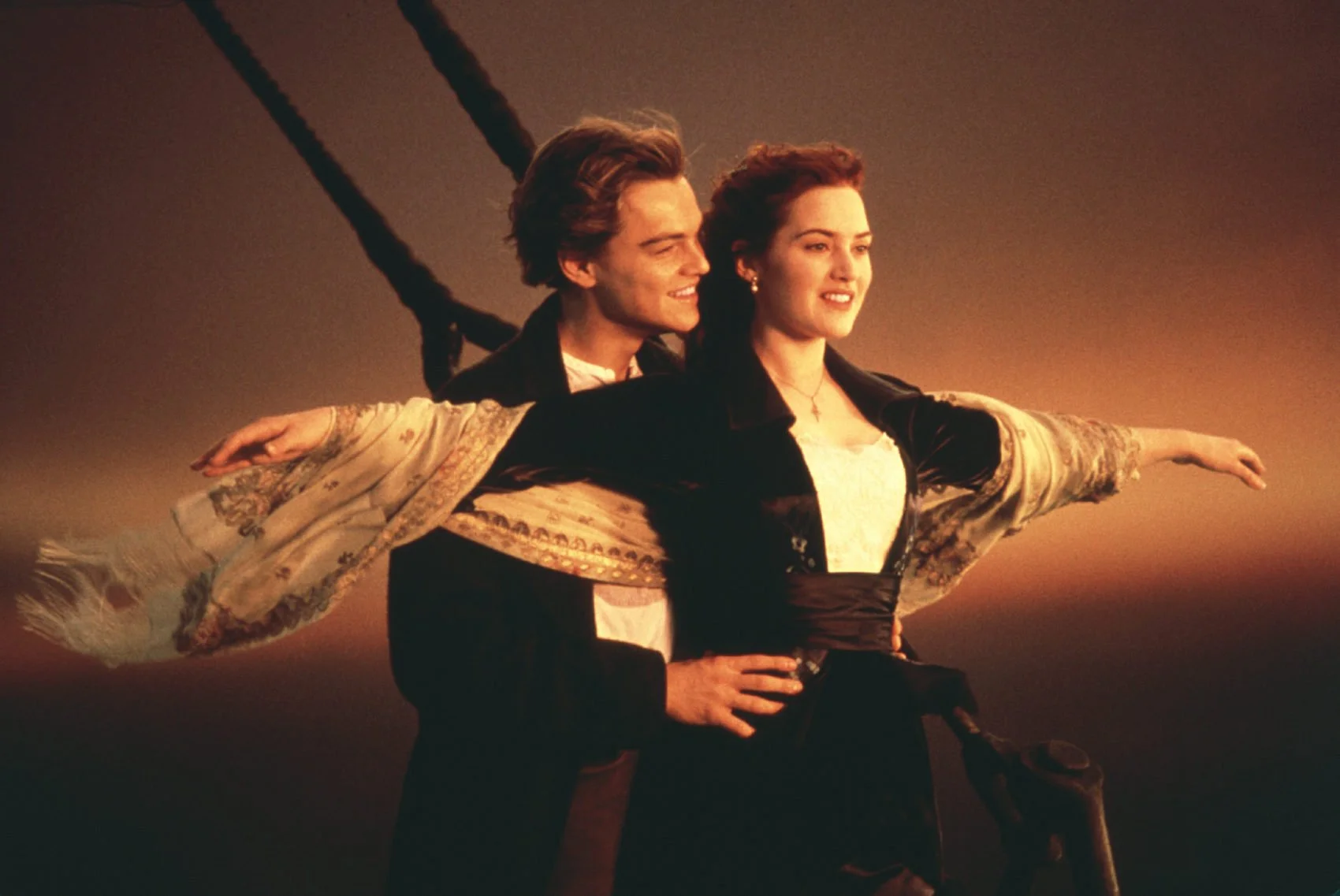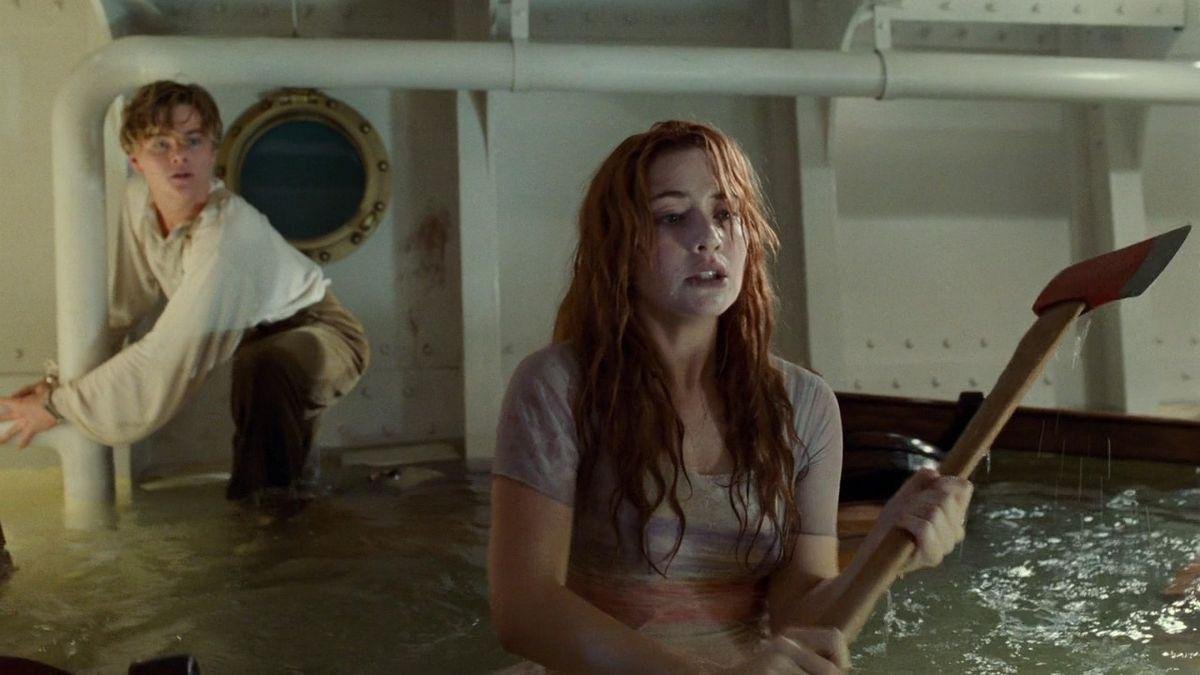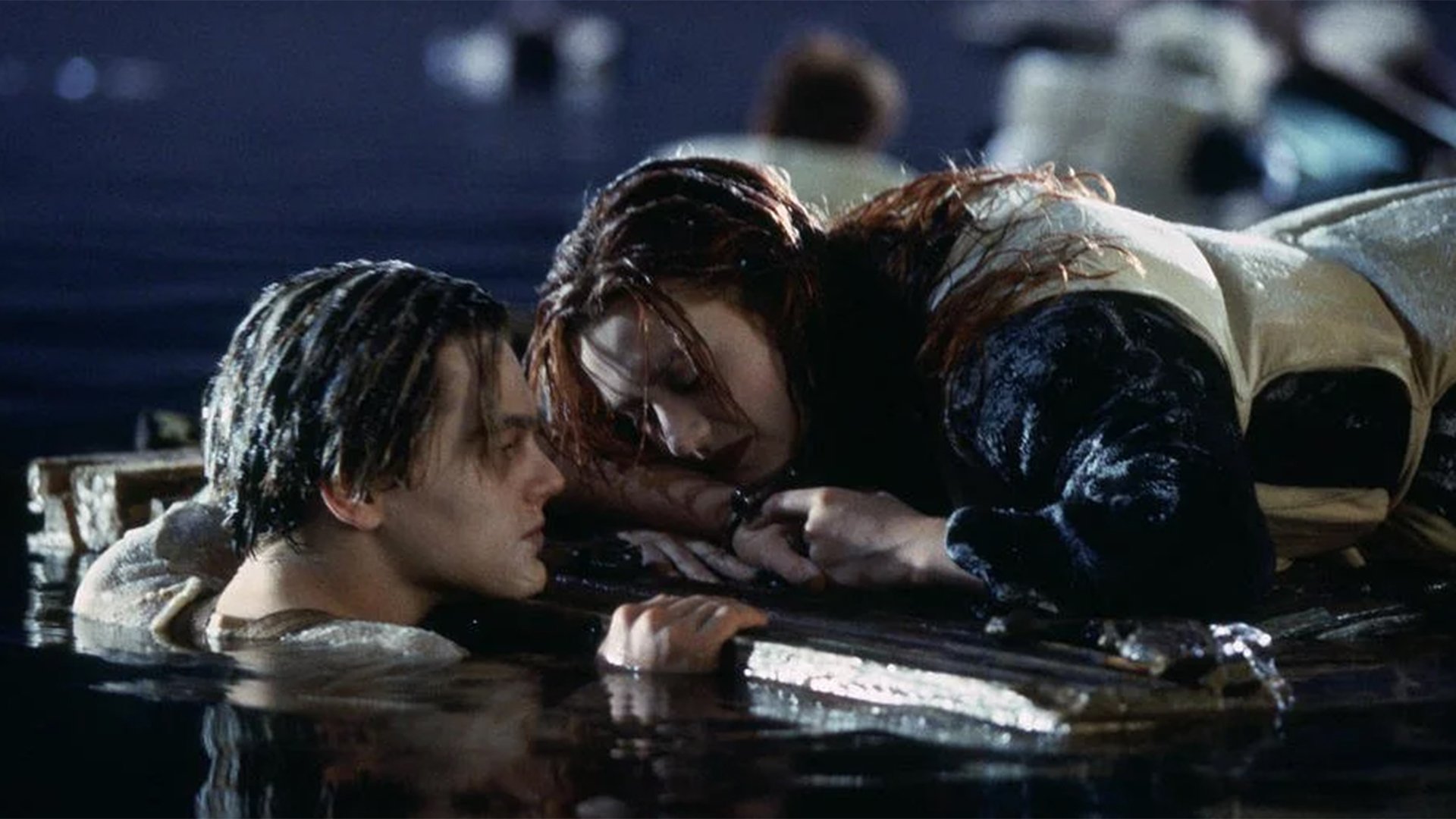Romance Week: TITANIC, tropes, and romance aboard the “ship of dreams”
by Ryan Silberstein, Managing Editor, and Tessa Swehla, Staff Writer
Ryan: As Titanic rises from the depths once again this Friday to celebrate its 25th anniversary, I thought it would be fun to take a look back at the movie through the lens of its romance elements. Romance is one of the foundational genres of fiction in any medium and yet doesn’t get the respect it deserves, in part because the most associated demographic is women. And as a man growing up in a culture that devalues it–from jokes about “bodice ripper” book covers to formulaic plotting–I really don’t feel as though I have even a basic understand of how the genre works, what some of the tropes are, and what to look for in these stories. As I’ve gotten older, I’ve become more interested, especially as love and lust seem to be evaporating from our most popular forms of PG-13 entertainment.
Using the highest grossing movies of all time as a metric, the situation seems even more dire. Titanic sits at 8th currently, and is one of only three movies older than 2015 to remain in the top 25. (The others are Nolan’s latter two Batman entries.) Out of the top 25, the only films that have a romance as either the A or B plot are Avatar (also directed by Cameron), the live-action remakes of Beauty and the Beast and The Lion King, and Top Gun: Maverick. That’s 20% of the list, and the rest is mostly superheroes, a genre that does have a ton of great romances to offer, but the current interpretation is basically sexless, as noted by Joshua Rivera at Polygon with his deep dive into the embarrassing lack of kissing in the Marvel Cinematic Universe.
Revisiting Titanic for the first time in several years, I was struck by the contrast between the time spent showing the romance versus the impact of the romance on the story. At the beginning, in the present day, it’s all about the Heart of the Ocean, but by the time we transition back to the present day, everyone surrounding older Rose (Gloria Stuart) has tears in their eyes for the lost love between her and Jack (Leonardo DiCaprio). It’s the takeaway from Titanic. And while the spectacle, the mass loss of life, and other elements of the story are important, there’s no way this film becomes such a megahit without the focus on Jack and Rose.
Tessa: Everyone loves a good old-fashioned forbidden upstairs-downstairs (or in this case, first class-steerage) romance. We were raised on children's tales about these kinds of romances–think Cinderella or The Princess Bride–so we recognize these tropes when we see them. There is something so thrilling about two people who aren't supposed to be together falling in love, especially because it imbues the narrative with external threats (in this case, Rose's horrible fiance and family) and internal challenges (the class differences between Jack and Rose).
Plus, having a romance at the heart of this narrative gives the audience a specific entry point into this huge, horrific event. The sinking of the Titanic is such a touchstone of 20th-century disaster storytelling that it is taught in middle school history classes, despite the fact that it was certainly not the only ship that sank that year or that lost so many poor passengers. (Fun fact: my uncle was actually part of the team that rediscovered the remains of the Titanic's sister ship, the Britannic, which sank four years later.) Viewers need named characters to root for, because otherwise the tragedy is just too big to grasp. Thus, Cameron does this clever thing where he uses the forbidden romance trope between two likable characters to supercharge our investment in the disaster. We know what happens to the Titanic, but we don't know what happens to Rose and Jack, and we want them to live so that they can overcome the obstacles to them being together. Ta-da, stakes.
Ryan: That is a great point about stakes and how the investment in these two fictional characters creates tension against the known event of the boat’s sinking. It also allows Cameron to let the historical figures, like Molly Brown (Kathy Bates), J. Bruce Ismay (Jonathan Hyde), and Thomas Andrews (Victor Garber), become supporting players in the Jack/Rose story. That also allows for the casting of great character actors in these roles, and each of them know how to make an impression. It gives that “Nearer My God to Thee” montage a lot of emotional weight, but all of these figures are introduced to use through the perspective of Rose (and occasionally Jack).
So, Tessa, tell me, how often does a romance kick off with an attempted suicide? I don’t think Rose is being overdramatic, but she is written to be a little more naive than maybe I’d like for a twenty-year-old. She’s definitely sheltered, but I would hope she’d try to push Cal (Billy Zane) overboard first. What are they trying to tell us about Rose when she and Jack first meet(-cute)?
Tessa: Funnily enough, I just rewatched On Her Majesty’s Secret Service, which also has an attempted suicide as a meet-cute. Suicide or not, it isn’t unusual for period romances to begin with a similar premise. Rose has what we might call “upper-class white lady problems.” She is from a genteel but impoverished family, and there are not a lot of options for women like this in 1912 to earn their own money. She could be a governess, a seamstress (as her mother reminds her), a wife, or a mistress. For most people, wife is the most respectable and lucrative option, and it is clear that her mother (Frances Fisher) has been grooming her for this role for a long time. Ladies like this were usually kept in the dark about a great many things (including sex) because it was assumed that their husbands would mold them into what they wanted in a wife.
The economics of marriage have been the subject of many romances since Jane Austen, especially marriage of the upper and middle classes. I had a professor once who described the plight of gentlewomen like Rose as perpetual waiting: she waits in a room for a person to come and take her to another room. Rose herself says this in her voiceover when she envisions her future as having the same conversations with the same people forever. Boredom and helplessness are real triggers for depression! For a minute there, she can’t bear to even imagine herself in such a future, and she’s been told the other options are not available to her.
Cal has all the power here, and I think her inability to say no to him at the beginning of the film says a lot about how the marriage contract favors men financially and physically. She can’t imagine pushing him over the side because that would be to commit social and economic suicide. His death would take her and her mother down with him.
For Jack, this probably does seem a bit naive, because the women in his life don’t have the luxury of boredom. His friends are French sex workers, at least one of which is disabled. Lower-class women had the same limited options as Rose, but they have to engage with physical and domestic labor in a way Rose does not. They are the seamstresses, the launderers, the mistresses, the housewives that Ruth is so horrified by. (And that’s not even getting into the physical labor of Black women, but that might be outside the purview of this article.) Many of the women Jack knows would probably happily push Rose off the ship and take her place as Cal's fiance.
To answer your original question, Rose is naive because everyone in her life wants her to accept her situation as the only option. It isn’t until she meets Jack that it even occurs to her that there might be a future for her that isn’t the one that Cal and Ruth have planned.
How do you feel about the insta-love that Jack has for Rose? What does this tell us about Jack?
Ryan: Thank you for thoroughly unpacking Rose’s situation there. Even as someone who loves history, it can be hard to leave my contemporary feelings behind entirely. And then thinking about a work of fiction that was made twenty-five years ago about a time that is eighty-five years before that can be enough to bake my noodle a little bit. Giving Rose the historical context she deserves helps drive a better understanding of the film’s goals on the whole. I don’t think it’s any big revelation that Cameron’s goal behind the movie was to satisfy his own passion around ocean exploration, specifically shipwrecks, and even more specifically the Titanic. This gives much of Titanic a cold, almost scientific approach, especially the hour or so that leads up to Jack and Rose meeting. There’s a lot of factual information alongside character-based exposition, but I think this all actually helps the story in a counterintuitive way.
Jack, Rose, and Cal feel the most alive of any of the characters in the movie for me, and many of the others feel like ghosts (and not just because the ending literalizes this). There’s a sad fatalism around the film’s historical characters, whether they survive or not. Seeing the sparks of curiosity between Jack and Rose catch into a full-on passionate romance jumps out even more against the somewhat clinical feel of the scenes in which they are not present.
At first, Jack is attracted to Rose for two reasons: her physical beauty and her status. Jack, growing up as a kind of vagabond, sees the trappings of Rose’s wealth without all of the strings attached. Just as she sees a sort of “freedom to” in him, the opportunity to follow her desires, in Rose, Jack sees a “freedom from” the financial hardships he has already endured. He wants the finer things, that kind of American dream of pulling-yourself-up-by-your-bootstraps that might as well be an American fairy tale for how often it actually happens. Despite the initial attraction stemming from this desire, I think the film shows the evolution from their actual meeting forward and makes it feel as organic as possible given the compressed timeline. That time compression is a staple of fiction going back to ancient Greek plays, and here it emphasizes some of the clearly intentional Romeo and Juliet parallels (bolstered by the fact that DiCaprio also starred in Baz Lurhmann’s William Shakespeare’s Romeo + Juliet the previous year). It’s a whirlwind affair on purpose.
Cameron emphasizes the time factor a lot. For much of the film, it is easy to imagine this relationship as a sort of fling: Rose getting a taste of independence before settling down, and Jack getting a glimpse at the finer things before being tossed back into third class. It’s kind of brilliant that the stakes of the ship are heightened, and that serves to create a sense of urgency in the pacing of the story but also drives clarity to the two young lovers as they are now making decisions in the face of life and death. By the time Rose is braving the flooded E deck, the love between them feels strong enough where it is clear that she is doing this for love of Jack and not because she is guilty that his life would be on her conscience later.
Watching now, the last act of the film hit me a lot harder than it did when I was younger. The sinking felt thrilling before, but now the level of tragedy and the intensity of it really shook me. The callousness of the wealthy class hit that much harder, likely for a number of reasons, and the absurdity of how much death was caused because *gasp* businesses don’t have the best interests of the public in mind. Even if White Star Line believed the Titanic to be unsinkable, not having enough lifeboats speaks to the priorities of the business owners towards those inhabiting the lower decks. Like so many of our worst tragedies, it wasn’t so much a tragic accident as manslaughter via capitalism. Was I radicalized . . . by James Cameron? Who’s to say.
How do you feel about how this romance fits into the larger historical story being told, and does it all work for you?
Tessa: The fact that this is an upstairs-downstairs romance set against a tragedy that primarily affected the lower class passengers works really well. If Rose wasn’t in love with Jack, she would have been on that first lifeboat with her mother and Molly, and she probably would have been horrified but ultimately unaffected by the screams of the dying in the frozen waters at the end. But because she refuses to leave Jack, she (and we by proxy) become part of that tragedy. Losing Jack is horrible not just because they are in love, but because it should have never happened. Not just because of the door situation (although they both would have fit!), but because there should have been enough lifeboats for all of them. The fact that Rose internalized this tragedy and loss by symbolically marrying Jack (taking his last name) gives her the necessary fuel to leave that way of living off the deaths of other people behind.
I think this romance works more for me now that it did when I first saw it ten years ago because I’m more aware that this kind of tragedy isn’t a historical one. But watching this spectacle and identifying with the central romance allows us to turn a more critical eye onto our own treatment of impoverished people.




